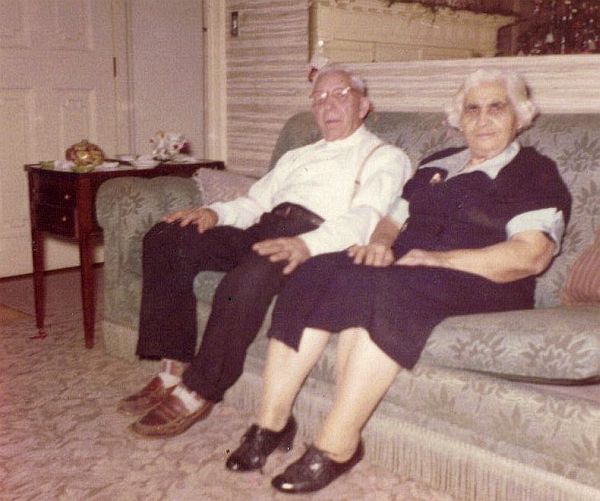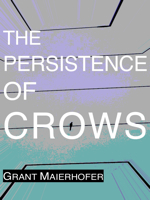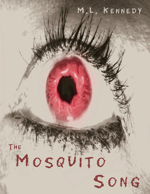
Attached to this brief bit of personal history is a photo of my adoptive maternal grandparents, Benedetto and Giustina Mariorenzi, wizened Italian peasants who, in the late 19th Century had hiked out of some God-forsaken hills above Naples, sailed to America, and managed to marry and establish a family. They appear to be occupying low centers of gravity, Newton’s Law made evident on a well-worn sofa. They don’t look like royalty, do they? By the time they’d raised a large family, there wasn’t enough vitality left in them to conceive of reinventing themselves as higher class citizens, as we do today. They were tough Dagos who’d walked out of the ancient Roman past and found their way to America, and they lived very close to the bone. Neither of them was planning to run for political office.
They arrived in America separately, and Married in Rhode Island. According to the Ellis island passenger manifest, my grandfather probably arrived on board a scow christened the “The Spartan Prince,” a somewhat ironic name for a boat that had probably been stuffed to the gunwales with passengers and smelled like a floating stockyard by the time his ship drifted past the Statue of Liberty.
Incredibly, both of them could read and write, mostly in their native language. My grandmother carried a small book around all her life that contained the dates of every birth, death, marriage and baptism in her family, and could consult it quickly when she needed information. But they clung to their language and customs, and only yielded to the inevitable when they had no other choice. When I was seven years old, I contracted a kidney infection. My grandfather viewed this as an opportunity to more fully induct me into the family. He took up temporary residence in our house and unsuccessfully attempted to teach me to write and speak in Italian.
During the previous summer, we’d gone back from Southern California to Rhode Island to visit family. My father must have sunk some serious money into the vacation, because we visited Quebec and Montreal, the Baseball Hall of Fame in Cooperstown, and took in a double-header at Fenway Park, where we watched Mickey Mantle and Roger Maris battle for the home run record. And we spent a lot of time climbing the stairs of Providence’s famous triple-decker apartment houses, where piano-legged aunties pinched my cheeks and stuffed me full of pasta. One afternoon, my father snuck into a bar for a quick shot of whiskey, and bumped into an old friend, the wonderfully-named “Johnny From New York”. I possess a powerful remembrance of their unexpected meeting. It was probably the first time I felt and understood the bonds that friendships could forge.
In the photo, which was taken during the Christmas season of 1959, Benedetto seems to be staring directly into the camera lens, waiting and watching. My grandmother is projecting a benign defiance, a confident pixie on the verge of cracking a broad smile because she was delighted to see us. Until a few days ago, I had never noticed that in the photo, my grandfather is sporting a pair of snazzy tan loafers, and if you look even closer at his feet, he seems to be wearing socks with flashes of red in the design. Was he wearing Christmas socks in that photo? Get outta here!
Grandpa Mariorenzi had hiked out of some God-forsaken village from somewhere up in the hills behind Naples, and lost an eyeball while working in a textile mill. He had a habit of slowly and constantly swinging his head from side to side, a nervous tic he never overcame, as though he was always saying “No.” At Sunday dinners at his house, my cousin Gerald and I would keep a very close watch on him, because occasionally his eye would swivel off to one side, and all you’d see was white where their should have been a cornea. One of his kids would mention it to him. He’d snatch it out, wipe it clean and re-insert it. We thought it worthy of close inspection.
My grandmother was a generous woman, always pressing treats upon us, and wanting to make sure we had enough to eat, because she and my grandfather knew what it meant to be truly hungry. She kept a pot of red gravy on the stove at all times, and if you admitted to being hungry, she’d fire up a pot of water and toss in some pasta. Generally, whatever she cooked tasted delicious, but both she and my grandfather cheerfully digested animal parts that failed to capture my or my cousins’ imagination. Intestines, hearts, livers, blood sausage or any of those suspect chunks could be lurking below the surface, so you took good care to inspect each piece carefully before popping it into your mouth.
During the depression, and long after, my grandfather ran a still out of his basement. One of my uncles told me that he made the best bootleg whiskey in that part of the state, and that he was equally adept at distilling brandy, wine, beer and various cordials, including Grappa, a grape-based brandy that always smelled to me like rancid raisins. In order to sell the stuff, he most surely had a connection with the mobsters in Providence, who took a “Mordita,” “the Grip,” a small bite of the profits, usually owed in those days to Raymond Patriarca, don of the New England mob, who gave the term “sleeping with the fishes” new and meaningful respect.
My grandfather never learned to handle an automobile, so when my mother was twelve years old she became the designated family driver, and from that day forth she barreled around West Warwick in my grandfather’s Model T Ford, and later a Model A. My grandfather sent her on errands whenever he felt that his English would fail to register with non-Mediterranean-born salesmen.
One afternoon he asked my mother to take him to Arctic, the shopping district in West Warwick, to purchase a new colander for my grandmother. My grandfather sailed up to the counter. “Can I help you?” said the clerk. My grandfather said to the clerk, “Spaghetti stay, water go through! “ The clerk thought it over for a minute, and then reached back over the counter, grabbed a colander and handed it to him, a successful monetary exchange that transcended cultural barriers.
When my grandparents grew too old to take care of themselves, they moved in with my Aunt Angie and her husband Sando Lombardi, where my grandfather spent a lot of time hiding in the basement from my grandmother and drinking the good wine he’d made himself. I heard that once she chased him down to the basement and took a rolling pin to his noggin. For Google Earth obsessives, they lived at 916 Providence Street, West Warwick, Rhode Island. My cousin Helene lives there now, but don’t bother her, because she’s probably busy, and I’m sure she owns a rolling pin.








